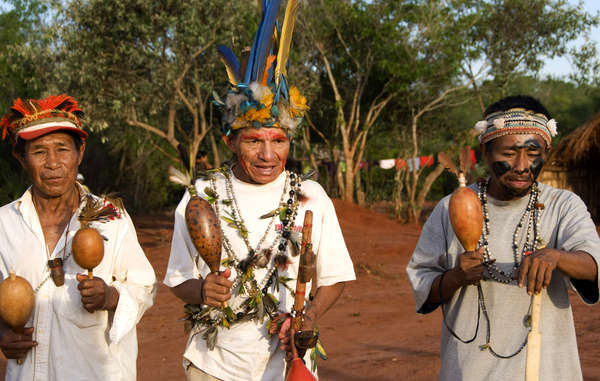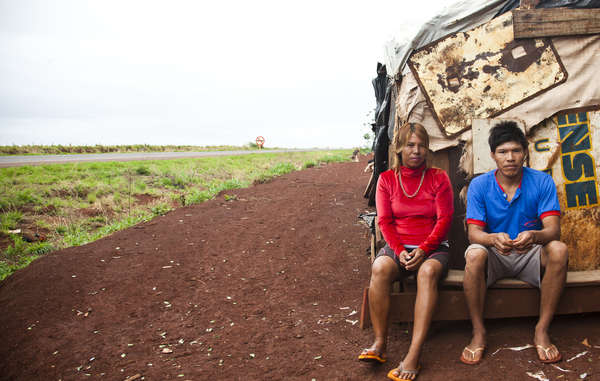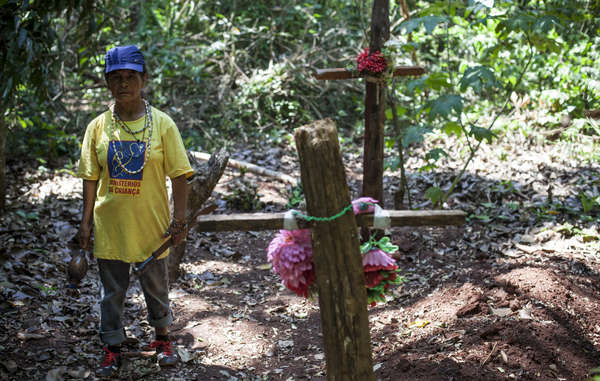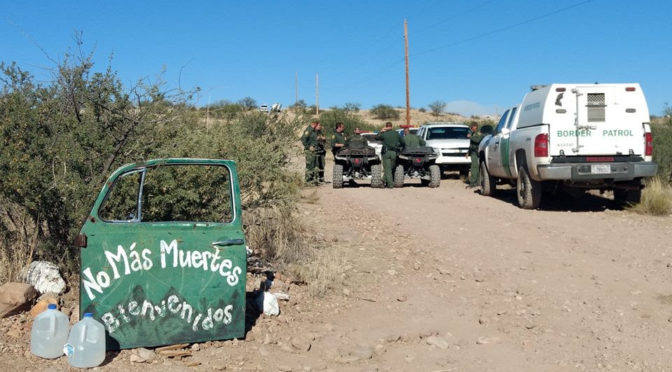
by Deep Green Resistance News Service | Dec 26, 2017 | Colonialism & Conquest
Featured image: The Guarani continue fighting for their land rights despite continuous attacks. © Fiona Watson/Survival International
by Survival International
Ten years ago the Brazilian government signed a landmark agreement with the Guarani tribe, which obliged it to identify all their ancestral lands.
The core objective of the agreement, which was drawn up by the public prosecutors office, was to speed up the recognition of the Guarani’s land rights in the southern state of Mato Grosso do Sul.
However, one decade on, most surveys have not even been carried out and the authorities’ failure to recognize the Guarani’s land rights continues to have a terrible impact on the tribe’s health and well-being.
With no immediate hope of recovering their land and rebuilding their livelihoods, thousands of Guarani are trapped in overcrowded reservations where the prosecutors say there is so little land that “social economic and cultural life is impossible.”
Other Guarani communities live along busy highways or on fragments of their ancestral land, hemmed in by vast sugar cane and soya plantations. They cannot plant, fish or hunt and have no access to clean water.

A Guarani-Kaiowa couple sit outside their makeshift roadside settlement of the Apy Ka’y community, near Dourados, Mato Grosso do Sul, Brazil. © Paul Patrick Borhaug/Survival
Health workers report that these communities are suffering from severe side effects of pesticides used by agribusiness. Some communities say their water resources and houses are deliberately sprayed by the ranchers.
A recent study estimated that 3% of the indigenous population in the state could be poisoned by pesticides, some of which are banned in the EU.
Malnutrition especially among babies and young children is common. According to Gilmar Guarani: “Children cry and cannot put up with this situation any more. They are really suffering and are very weak. They are practically eating earth. It’s desperate.”
Mato Grosso do Sul is home to the second largest indigenous population in Brazil, with 70,000 Indians belonging to seven tribes.
Much of their ancestral land has been stolen from them by cattle ranchers and agribusiness, and now they occupy a mere 0.2 % of the state.
John Nara Gomes says: “Today the life of a cow is worth more than that of an indigenous child… The cows are well fed and the children are starving. Before we were free to hunt, fish and gather fruits. Today we are shot by gunmen.”
The despair among the Guarani at the loss of their lands and self sufficient life is reflected in extremely high rates of suicide . In the period 2000-2015 there were 752 suicides. Statistics collected since 1996 reveal a rate that is 21 times greater than the national one. This is probably under-estimated as many suicides are not reported.

Damiana Cavanha, leader of the Apy Ka’y community, has seen the deaths of three of her children and her husband. She is determinedly planning a reoccupation of their ancestral land where they are buried. © Paul Patrick Borhaug/Survival
The Guarani also face high levels of violence and are constantly targeted by ranchers’ gunmen whenever they attempt to take back parts of their ancestral land. Recent data shows that 60% of all the assassinations of indigenous people in Brazil occurred in Mato Grosso do Sul state.
With a government and congress dominated by the powerful agribusiness sector, the landowners in Mato Grosso do Sul will not cede an inch. Many have resorted to the courts as a delaying tactic, to challenge the identification of Guarani territories. One core Guarani territory has had 57 legal challenges.
Despite this bleak scenario many Guarani vow to fight on: “Brazil was always our land. The hope that feeds me is that our land will be recognized, for without it we cannot care for nature and feed ourselves. We shall fight and die for it” says Geniana Barbosa, a young Guarani woman.

by Deep Green Resistance News Service | Jun 17, 2017 | Repression at Home
by No More Deaths
Arivaca, AZ—In temperatures surging over 100 degrees Fahrenheit, the US Border Patrol raided the medical-aid camp of humanitarian organization No More Deaths and detained four individuals receiving medical care. Obstruction of humanitarian aid is an egregious abuse by the law-enforcement agency, a clear violation of international humanitarian law, and a violation of the organization’s agreement with the Tucson Sector Border Patrol.
This afternoon, in an unprecedented show of force, approximately 30 armed agents raided the camp with at least 15 trucks, two quads, and a helicopter to apprehend four patients receiving medical care.Agents from the Border Patrol began surveilling the No More Deaths camp on Tuesday, June 13 at around 4:30 p.m. Agents in vehicles, on foot, and on ATVs surrounded the aid facility and set up a temporary checkpoint at the property line to search those leaving and interrogate them about their citizenship status. The heavy presence of law enforcement has deterred people from accessing critical humanitarian assistance in this period of hot and deadly weather. These events also follow a pattern of increasing surveillance of humanitarian aid over the past few months under the Trump administration.
For the past 13 years, No More Deaths has provided food, water, and medical care for people crossing the Sonoran Desert on foot. The ongoing humanitarian crisis caused by border-enforcement policy has claimed the lives of over seven thousand people since 1998. Human remains are found on average once every three days in the desert of southern Arizona.
Kate Morgan, Abuse Documentation and Advocacy Coordinator for the organization, said, “No More Deaths has documented the deaths and disappearances of hundreds of migrants in the Arivaca corridor of the border. Today’s raid on the medical aid-station is unacceptable and a break in our good-faith agreements with Border Patrol to respect the critical work of No More Deaths.”
John Fife, one of the founders of No More Deaths, commented, “Since 2013 the Tucson Sector of the Border Patrol has had a written agreement with No More Deaths (NMD) that they will respect the NMD camp as a medical facility under the International Red Cross standards, which prohibit government interference with humanitarian-aid centers. That agreement now has been violated by the Border Patrol under the most suspicious circumstances. The Border Patrol acknowledged that they tracked a group for 18 miles, but only after the migrants sought medical treatment did the Border Patrol seek to arrest them. The choice to interdict these people only after they entered the No More Deaths camp is direct evidence that this was a direct attack on humanitarian aid. At the same time, the weather forecast is for record-setting deadly temperatures.”
People crossing the deadly and remote regions of the US–Mexico border often avoid seeking urgent medical care for fear of deportation and incarceration. For this reason, a humanitarian-focused aid station in the desert is an essential tool for preserving life. The targeting of this critical medical aid is a shameful reflection of the current administration’s disregard for the lives of migrants and refugees, making an already dangerous journey even more deadly.
In spite of this, No More Deaths remains committed to our mission to end death and suffering in the desert and will continue to provide humanitarian aid, as we have for the past 13 years.




